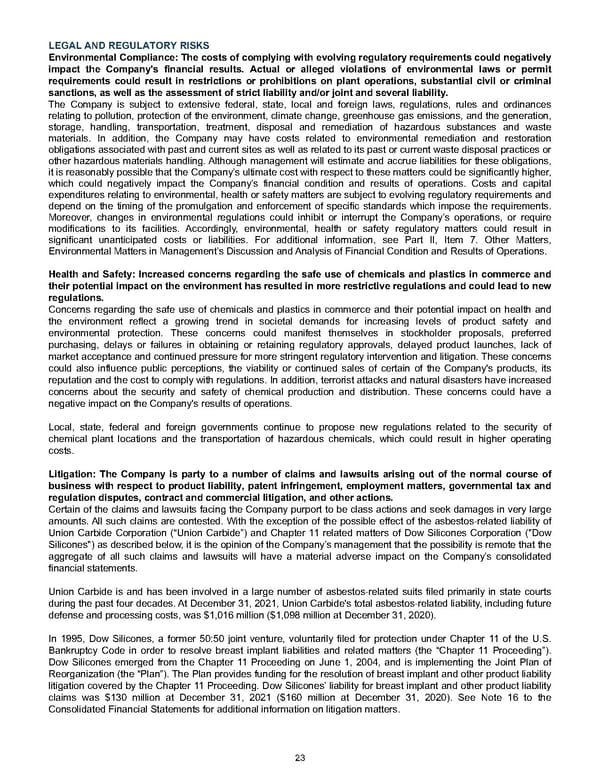LEGAL AND REGULATORY RISKS Environmental Compliance: The costs of complying with evolving regulatory requirements could negatively impact the Company's financial results. Actual or alleged violations of environmental laws or permit requirements could result in restrictions or prohibitions on plant operations, substantial civil or criminal sanctions, as well as the assessment of strict liability and/or joint and several liability. The Company is subject to extensive federal, state, local and foreign laws, regulations, rules and ordinances relating to pollution, protection of the environment, climate change, greenhouse gas emissions, and the generation, storage, handling, transportation, treatment, disposal and remediation of hazardous substances and waste materials. In addition, the Company may have costs related to environmental remediation and restoration obligations associated with past and current sites as well as related to its past or current waste disposal practices or other hazardous materials handling. Although management will estimate and accrue liabilities for these obligations, it is reasonably possible that the Company’s ultimate cost with respect to these matters could be significantly higher, which could negatively impact the Company’s financial condition and results of operations. Costs and capital expenditures relating to environmental, health or safety matters are subject to evolving regulatory requirements and depend on the timing of the promulgation and enforcement of specific standards which impose the requirements. Moreover, changes in environmental regulations could inhibit or interrupt the Company’s operations, or require modifications to its facilities. Accordingly, environmental, health or safety regulatory matters could result in significant unanticipated costs or liabilities. For additional information, see Part II, Item 7. Other Matters, Environmental Matters in Management’s Discussion and Analysis of Financial Condition and Results of Operations. Health and Safety: Increased concerns regarding the safe use of chemicals and plastics in commerce and their potential impact on the environment has resulted in more restrictive regulations and could lead to new regulations. Concerns regarding the safe use of chemicals and plastics in commerce and their potential impact on health and the environment reflect a growing trend in societal demands for increasing levels of product safety and environmental protection. These concerns could manifest themselves in stockholder proposals, preferred purchasing, delays or failures in obtaining or retaining regulatory approvals, delayed product launches, lack of market acceptance and continued pressure for more stringent regulatory intervention and litigation. These concerns could also influence public perceptions, the viability or continued sales of certain of the Company's products, its reputation and the cost to comply with regulations. In addition, terrorist attacks and natural disasters have increased concerns about the security and safety of chemical production and distribution. These concerns could have a negative impact on the Company's results of operations. Local, state, federal and foreign governments continue to propose new regulations related to the security of chemical plant locations and the transportation of hazardous chemicals, which could result in higher operating costs. Litigation: The Company is party to a number of claims and lawsuits arising out of the normal course of business with respect to product liability, patent infringement, employment matters, governmental tax and regulation disputes, contract and commercial litigation, and other actions. Certain of the claims and lawsuits facing the Company purport to be class actions and seek damages in very large amounts. All such claims are contested. With the exception of the possible effect of the asbestos-related liability of Union Carbide Corporation (“Union Carbide”) and Chapter 11 related matters of Dow Silicones Corporation ("Dow Silicones") as described below, it is the opinion of the Company’s management that the possibility is remote that the aggregate of all such claims and lawsuits will have a material adverse impact on the Company’s consolidated financial statements. Union Carbide is and has been involved in a large number of asbestos-related suits filed primarily in state courts during the past four decades. At December 31, 2021 , Union Carbide's total asbestos-related liability, including future defense and processing costs, was $1,016 million ( $1,098 million at December 31, 2020 ). In 1995, Dow Silicones, a former 50:50 joint venture, voluntarily filed for protection under Chapter 11 of the U.S. Bankruptcy Code in order to resolve breast implant liabilities and related matters (the “Chapter 11 Proceeding”). Dow Silicones emerged from the Chapter 11 Proceeding on June 1, 2004, and is implementing the Joint Plan of Reorganization (the “Plan”). The Plan provides funding for the resolution of breast implant and other product liability litigation covered by the Chapter 11 Proceeding. Dow Silicones’ liability for breast implant and other product liability claims was $130 million at December 31, 2021 ( $160 million at December 31, 2020 ). See Note 16 to the Consolidated Financial Statements for additional information on litigation matters. 23
 Annual Report Page 32 Page 34
Annual Report Page 32 Page 34